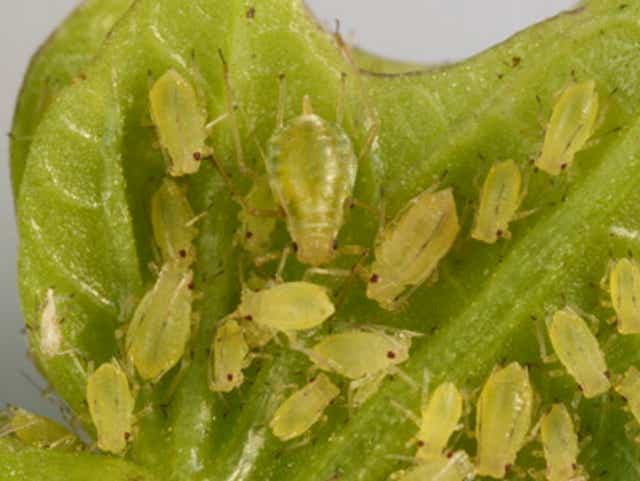There are some critters that we encounter that are just "out of this world." Aphids are one of these insects whose ability to reproduce in unique ways is unequaled. Depending on the time of year and the environment they are in, they have the ability to produce progeny without any male aphid involvement; the ability to give birth to live progeny identical to the mother; to lay eggs that will hatch into either male or female aphids; and even the ability to produce winged progeny to ensure repopulation in areas that are less crowded and have a better food supply. Who would believe this is possible?
Aphids are soft-bodied insects that range in size from two to three millimetres in length, are generally pear shaped and come in many colours. They may or may not have wings. They feed by piercing the plant tissue and sucking out the juices of the plant. They prefer to dine on new growth that is succulent and tender – like shoots, buds and the underside of leaves. As they eat, the excrete honeydew which is just a nicer term for aphid urine. You may also see frass which is again a nicer name for excrement.
You may also see aphids inside your homes - especially if you move your tropical plants or any other plant outside for the summer months and then bring them back into the house as fall arrives. As with many pest problems, aphid control begins with good cultural practices. Keep your plant material in good shape and more often than not, they can withstand most aphid infestations.
When combating any pest problem, it is also important to understand the lifecycle of a pest. There are many different species of aphids, each having its own particular life cycle; however, there are some features that are similar with all species.
One of the most common features of aphids is that they are incredibly prolific. Wingless adult females can produce up to 50 to 100 offspring. Even more amazing is that within about a week, the newly born aphid becomes a reproducing adult that can then produce up to five offspring per day for up to 30 days. What is even more amazing is that with most species of aphids, reproduction is accomplished without the help of male aphids in a process called parthenogenesis.
When female aphids reproduce parthenogenetically, instead of laying eggs they give birth directly to smaller versions of themselves. A single mother aphid has the ability to produce 600 billion offspring in a single growing season.
The average life cycle of an aphid begins in the spring when the overwintered egg hatches. This produces a wingless female aphid that soon parthenogenetically produces more wingless females. Their individual lifespan is short but generations of wingless females will survive one another until hot weather comes or the plant they are living on dies. At this time, some of the females will grow wings and fly off.
Typically, late in the year when winter is soon approaching, some aphids will develop into both males and females. Sexual reproduction takes place and the females will lay fertilized eggs on the chosen host plant. Next spring, females will hatch from the eggs and the cycle continues.
Aphids are preyed on by a wide range of natural predators, including the ladybird beetles, lacewing flies and syrphid flies. However, in some cases the aphids are present in much higher numbers than their predators. When this happens it is a good idea to exercise control measures.
The least toxic alternative always takes more work. If you are having an outbreak inside, ensure you only use products which are recommended for that area. One solution if you catch the infestation early is to spray the infected plants frequently with water at high pressure. This will wash away some aphids and kill others with the impact of the water.
Please, if you choose to use a registered pesticide, always follow the specific product instructions and use proper safety precautions as specified on the product label.
Hanbidge is the lead horticulturist with Orchid Horticulture. Find us at www.orchidhort.com; by email at [email protected]; on facebook @orchidhort and on instagram at #orchidhort.
Tune into GROW Live, weekly on our facebook page https://www.facebook.com/orchidhort/?modal=admin_todo_tour or check out the channel GROW https://www.youtube.com/channel/UCzkiUpkvyv2e2HCQlFl0JyQ?on youtube.




